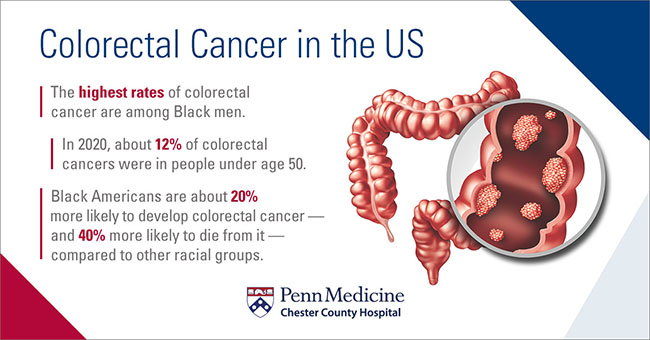
Chadwick Boseman was the face of strength and success. His roles in Hollywood -- like
Black Panther,
Ma Rainey's Black Bottom and
The Avengers -- were full of confidence, ambition and power. While his career as an actor and a playwright was taking off, he was also happily married to the love of his life.
He seemed to be at a peak in his life until, at the age of 43, he took his final breath in a shocking and saddening loss to colorectal cancer.
Colorectal cancer — which is cancer of the colon or the rectum — is rarely associated with the young and healthy. However, not only can colorectal cancer affect young people, it also affects Black men (and Black Americans generally) disproportionately.

The statistics behind colorectal cancer, particularly among Black men, are devastating. However, with heightened awareness and increased screenings, colorectal cancer rates among this population (and every population) can decrease. Here’s how.
Why Are Black Americans More Likely to Develop and Die from Colorectal Cancer?
The reasons for health disparities — which are preventable differences in how a disease impacts a population — are not cut and dry. However, there are known factors that contribute to health disparities, including that of colorectal cancer among Black Americans.
In general, Black Americans face differences in risk factors as well as healthcare access. As a result, they are up against more significant hurdles when it comes to preventing, finding, treating and surviving cancer.
While obstacles vary widely, they can include:
- Lack of (or more limiting) health insurance
- Less access to healthy foods that are affordable
- Lower quality education
- Lower quality housing
- Lower income
- Poor experiences with healthcare providers
Some of these hurdles are clear indicators of why individuals may struggle with catching, preventing or treating cancer. Take health insurance, for example. If you have limited healthcare coverage, you might not be able to keep up with regular check-ups and screenings that can identify health problems early. Or, if you have had negative interactions with healthcare providers in the past (which over 40% of Black men between the ages of 18 and 49 have reported experiencing), you may be less likely to stay up-to-date with your healthcare needs.
Other factors may not seem directly related to cancer, but they still play a role in a person's overall health. For instance, lower-quality education can lead to a limited ability to navigate a confusing healthcare system. It can also make it more difficult to understand basic health information.
How to Find (and Even Prevent) Colon Cancer
Colorectal cancer is a significant issue, but there are ways to find and even prevent this disease using screening tests – tests that are done before symptoms develop.
Using a colorectal cancer screening, your healthcare provider can locate and remove polyps, which are growths that can turn into cancer. This can prevent cancer from ever developing. Screenings can also find cancer in its early stages when it's easier to treat.
"Because of the rising rates of colorectal cancer among young people, the screening recommendation for individuals of average risk is now 45 years old,” says Zachary Quinn, MD, Hematologist/Medical Oncologist at Chester County Hospital. "If you have a higher risk of colorectal cancer (such as a family history of colorectal cancer), talk to your healthcare provider about the best time to begin screening."
Colorectal cancer screening can take the form of:
- Stool-based tests, which check stool for signs of cancer, such as fecal immunochemical tests (FIT), guaiac-based fecal occult blood tests (gFOBT), and stool DNA tests
- Visual (or structural) tests, which check the structure of the colon and rectum for signs of cancer, such as colonoscopy, CT colonography (or a virtual colonoscopy), and flexible sigmoidoscopy
Stool-based tests are often less expensive and can be done at home, making them easier and more accessible for many people. However, they need to be done more frequently. Visual tests must be performed with a healthcare provider, but they don't need to be done as often.
Lowering Rates of Colorectal Cancer Among Black Americans
Reducing health inequities like the rate of colorectal cancer among Black Americans requires the efforts of many parties. From healthcare providers and health insurance companies to loved ones and patients themselves, these groups must recognize the importance of screenings, support patients in getting them, and encourage one another to stay on top of their colorectal health.
With more awareness about colorectal cancer screenings and increased support in accessing them, this nation can take a small step toward saving the lives of countless individuals — one cancer screening at a time.
Do you have questions about colorectal cancer screening? Talk to your Chester County Hospital primary care provider about how colorectal cancer screening can help prevent cancer. If you’d like to schedule a colonoscopy today, click here to schedule your screening.